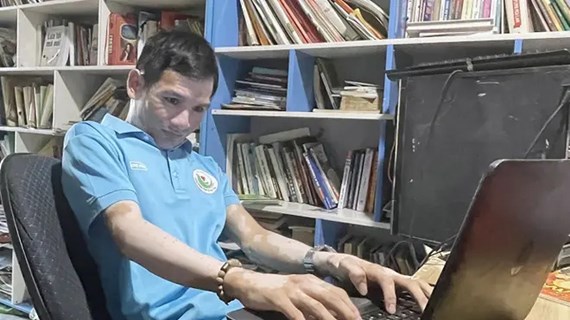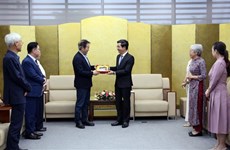Party leader stresses internal force, confidence
The following is the full interview.
Reporter: We have gone through half of the path of the 11 th Party
Congress in the context of numerous difficulties and challenges. Could
you talk about the major outcomes the country has made after the
three-year implementation of the Resolution of the 11 th Party
Congress?
Party General Secretary Nguyen Phu Trong
: Looking back on the past three years, we can see that the world
situation, in addition to advantages, has seen complicated developments.
Conflicts in many places and the global financial-monetary crisis and
economic recession have negatively impacted on our national construction
and defence. In the country, high inflation and public debts have
threatened macroeconomic stability. Economic growth has slowed down,
production and business activities faced many difficulties as did the
people in their lives, while natural disasters and epidemics have caused
serious damage.
In that context, our Party and
State have timely adjusted and well organised the implementation of
guidelines, policies and measures to bring the national economy out of
difficulty. Many positive and on-track results have been achieved.
Notably, inflation was controlled, the macro economy basically
stabilised, economic growth rate maintained at a suitable level, and
social security has been guaranteed.
The consumer
price index ( CPI ) dropped from 18.13 percent in 2011 to over six
percent in 2013, the lowest level in 10 years. Economic growth has been
maintained at 5.6 percent per year. Social welfare policies have
continued to be implemented, creating nearly 1.6 million jobs and
providing a regular social allowance for more than 2.5 million people,
while the poverty rate was further reduced.
Attention has been paid to cultural and sports activities in combination
with the movement “all people unite to build cultural life” and the
new-style rural building programme.
Political
security, social order and safety have been maintained while national
defence has been strengthened, and national sovereignty and territorial
integrity have been protected.
Foreign relations
work has been stepped up comprehensively and recorded numerous important
achievements, contributing to ensuring a peaceful and stable
environment favourable for national construction and defence.
Together with upgrading and developing bilateral relations with many
partner countries in a more intensive and practical manner, Vietnam
has actively and proactively joined important cooperation mechanisms in
the region and the world. Vietnam for the first time was elected to
the United Nations Human Rights Council, the UNESCO World Heritage
Committee, and the Board of Governors of the Vienna-based International
Atomic Energy Agency (IAEA), showing the country’s increasing prestige
and position in the international arena.
Despite the
world economic downturn, Vietnam ’s export turnover has increased 22
percent per year on average and its trade balance has improved
remarkably. Newly-registered and increased foreign direct investment
(FDI) has grown year-to-year, accounting for 25 percent of total social
investment. In 2013 alone, registered FDI reached 22 billion USD, up 35
percent against the previous year.
Vietnam ’s
tourism has continued to reap successes, serving 7.5 million foreign
arrivals and 35 million domestic visitors with total earnings of 200
trillion VND (over 9.5 billion USD), two years ahead of schedule as set
in the sector’s development strategy.
The Party
Central Committee’s resolutions and conclusions have been carried out
seriously by agencies at all levels. The implementation of three
breakthroughs in combination with growth model renovation and economic
restructuring has yielded a number of initial results. Natural resources
management, environmental protection and climate change adaptation have
received proper attention. Party and political system building has been
enhanced in parallel with studying and following the moral example of
President Ho Chi Minh, and intensifying the fight against corruption and
wastefulness as well as promoting thrift practice. The democratic
environment within the Party and in society has been continuously
expanded and promoted.
In particular, with the
active participation and high responsibility of the entire Party, people
and armed forces, a new Constitution has been approved by the
overwhelming majority of deputies in the 13 th National Assembly at
their sixth session late last year, creating a premise for our nation to
confidently and firmly march forward on its selected path towards
building the Socialist Republic of Vietnam into a strong country with
wealthy people and a democratic, fair and civilised society.
Lessons learnt and experience gained from respectable achievements
seen over the past three years include knowing how to promote the
strength of great national unity, always take care of the people and
maintain their trust in the leadership of the Party and the management
of the State, as well as making full use of internal strength while
taking advantage of foreign resources to serve the successful
implementation of goals and tasks set by the 11 th Party Congress.
Reporter: Many major corruption cases have been
brought to court and tried in a strict manner recently, which receives
the public’s approval and high evaluation. Is this a more drastic step
in the implementation of the resolution on Party building issued at the
fourth session of the 11 th Party Central Committee (Resolution 4)?
Party General Secretary Nguyen Phu Trong :
Anti-corruption is a major task and content in the Resolution. The
Central Steering Committee for Anti-corruption was formed in compliance
with a resolution set at the fifth session of the Party Central
Committee. Since its inception nearly one year ago, the committee, under
the Political Bureau, has made all-out efforts and reaped fruits in
some aspects. The anti-corruption apparatus has been consolidated
through the re-establishment of internal affairs committees from central
to grassroots levels. Seven working missions were dispatched to
ministries, branches and localities, including central judicial
agencies, to inspect the investigation, prosecution and trial of major
embezzlement cases which drew public concern. A number of unsettled
corruption cases of public interest have also been fast-tracked. The
committee decided to put eight cases and two matters under its direct
close watch in 2013, and will add several cases and matters to the list
this year.
However, anti-corruption is a long-term
and tough task that requires a synchronous and comprehensive approach,
as well as the combination of many methods with prevention as the basic
measure while fighting must be done in a drastic manner . The best way
is to prevent it from occurring, with mechanisms in place to make people
not want to, dare not to and unable to take part in corruption
activities. In case it does happen, it is a must to strictly treat the
violations in line with the law. Severe treatment is also seen as a
positive way to prevent corruption.
If embezzlement
is a stinging furuncle, wastefulness in all forms from property ,
money, natural resources, to time and labour , is also a headache.
Resolution 4 aims to fight against corruption, wastefulness, group
interests, and the degeneration of Party members, including leaders and
managers, among others. Reality proves that the implementation of
Resolution 4 has allowed each organisation, Party official and Party
member to look back on themselves and adjust their thoughts and actions.
It has also helped alert and prevent violations. Through criticism and
self-criticism, the Party’s committees and organisations at all levels
as well as each Party official and member have conducted pragmatic
activities to correct their shortcomings. At the central level, a range
of mechanisms, policies and regulations have been rolled out in order to
bring into full play achievements while preventing and limiting
negative phenomena. Apart from the planning of strategic-level
officials, refresher courses have been opened for members of the 11 th
Party Central Committee, and training classes for potential officials.
Regulations have been issued on how Party officials and members,
especially those holding chief positions, should set example for others
to follow, on votes of confidence on several leadership and management
posts, what Party members are permitted to do as well as the inspection,
monitoring of Party officials and members’ observance of Party
disciplines have been issued. Many localities checked, adjusted and
withdrew licences of delayed projects or those which could not be
implemented due to investors’ difficulties. They also rearranged the
organisation of State apparatus and reappointed several officials, while
focusing efforts on addressing a number of prolonged petitions and
complicated cases of public concern. Many agencies and units have
tightened the use of public cars and budget for organising conferences
as well as revamped working styles. Expenditure for working trips to
localities and formalities have also been cut. More meetings with people
were organised in an effort to grasp their thoughts and aspirations.
Via such frank and open talks, officials at central level have been able
to understand better the situations of localities and units, learn
about useful experiences to disseminate as well as difficulties that
need to be remove, thus gaining more information and reference for
policy making.
Such meaningful and necessary
activities have received a warm response from Party officials and
members as well as the public. People hope that Party officials and
members will always set good examples, improve themselves, keep in close
contact with the public, do their best to serve the people, listen to
the people and learn from the people even in the smallest thing.
The market economy and integration process have its negative sides
which impact on the thinking and aspirations of a section of Party
officials, members and people. At the same time, negative phenomena,
corruption, and degradation in political thoughts, morality and
lifestyles have harmed the prestige of the Party and State and eroded
people’s confidence. In that context, the effective implementation of
three urgent issues and four groups of solutions set in Resolution 4 is
of vital importance in order to make the Party stronger and purer,
worthy of its role as leader of the country.
Reporter: In the last two years of the Party’s 11th tenure (
2014-2015 ), the country’s economy will still be in difficulty. In your
opinion, which things should be prioritised in order to fulfil the set
targets of the 11 th Party Congress’s Resolution?
Party General Secretary Nguyen Phu Trong: During the next two
years, heavy duties are awaiting , requiring great effort of the Party,
the whole people and army to fulfil the set targets. The top priority
remains to maintain macroeconomic stability, curb inflation, keep an
appropriate growth rate and ensure social security. In the immediate
future, it is necessary to remove difficulties and mobilise resources
for business and production sectors, creating a driving force and
building confidence for the people and enterprises, and recovering the
pace of growth. At the same time, it is a must to improve the economy’s
quality, effectiveness and competitiveness on the basis of achieving
three strategic breakthroughs (in institutions , human resources and
infrastructure) in combination with renovating the growth model,
restructuring the economy by taking specific and suitable measures to
support growth recovery and ensure fast and sustainable development for
the coming years.
After eight plenums, the 11 th
Party Central Committee issued many resolutions and decisions to
orientate the settlement of key issues for the country’s long-term
development, such as science-technology development; comprehensive
reform of education-training; response to climate change, effective
management and use of land, forests and minerals; and building and
improvement of infrastructure, meeting the requirements of the country’s
industrialisation and modernisation. In addition, the Party Central
Committee also requested paying attention to dealing with socio-cultural
issues, unceasingly improving people’s spiritual and material lives and
maintaining political security and social order and safety.
The targets and orientation have been set clearly. But to actually
create changes in reality, specific steps need to be taken with creative
application by authorities at all levels and sectors which are suitable
to each locality and agency’s potential, strengths and conditions.
During working trips and meetings with local officials, I repeatedly
stressed that implementing industrialisation does not mean developing
industry without planning and at any cost. It is necessary to select
priority and key industry for investment on the basis of each locality’s
conditions with a view to maximising the increasing influence of
industry on agricultural development. In the context of the economic
downturn, production and business activities are facing many
difficulties, it is the agricultural sector that upholds its important
role in ensuring social security. For localities with advantages in
agro-forestry development, it is necessary to reorganise production to
produce goods on large scale in combination with developing the
processing industry, building effective production models, and suitable
and high quality products to serve domestic markets and for export. Even
those with high industrialisation and urbanisation rates, such as Binh
Duong, Dong Nai and Bac Ninh provinces should not neglect agriculture,
instead they have to focus on developing the sector using
high-technology. In industrial development, it is essential to select
high added value and environmentally friendly sectors; invest more into
support industries to reduce dependence on imports; focus on growth
value and quality to bring practical benefits for the people.
In 2014, apart from favourable conditions, there will be difficulties
and challenges. In this context, we should hold our firm belief and
raise high our determination and consensus. Every action should be aimed
at fulfilling the set targets, creating changes in reality.
On the occasion of the New Year, I would like to extend best wishes to
all people and soldiers nationwide and the overseas Vietnamese
community. I wish every Vietnamese family welcome a warm traditional New
Year with new impetus, determination and belief, together with the
whole Party, people, and army to successfully implement the set targets
and tasks, helping the country overcome difficulties and continue to
develop sustainably.-VNA












